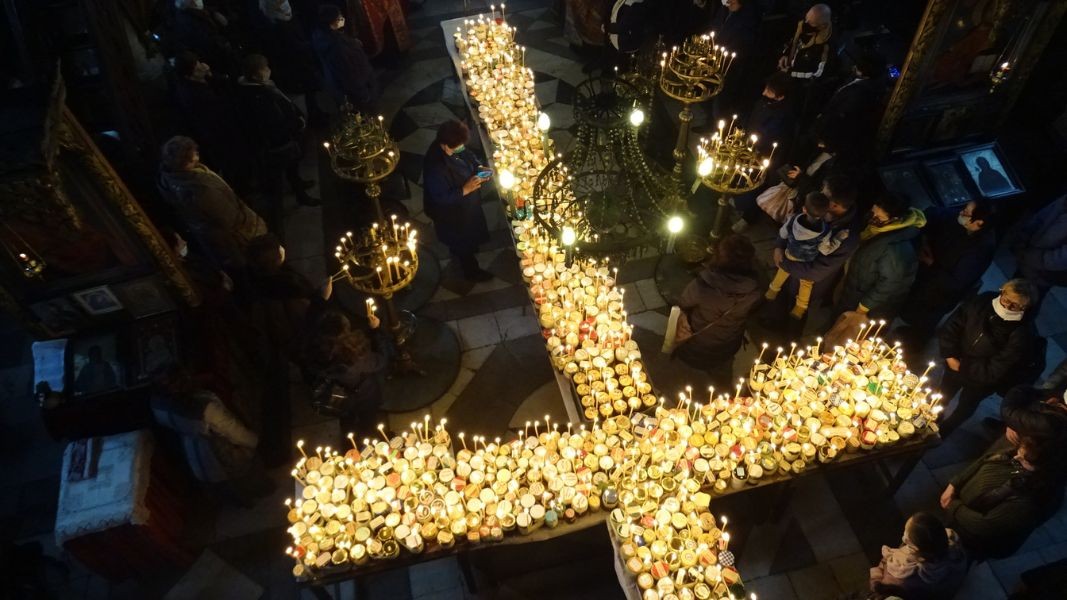
On February 10, the Bulgarian Orthodox Church honors the memory of Great Martyr Haralambos the Wonderworker who lived in the 2 century in Asia Minor. Saint Haralambos is regarded as patron saint of bees and apiarists, as since time immemorial people have relied on honey to cure all kinds of illnesses. Today, honey is sanctified in all Bulgarian Christian temples. It is believed that honey has a greater purifying and healing power when it is sanctified. Unfortunately, industrial agriculture has destroyed much of the lush meadows with blooming wildflowers and herbs. “Nature abounds in nectar. Bees use only 5% of it. The rest of the nectar is evaporated by the sun and washed away by the rain. The question is whether there are enough healthy bees to collect this nectar!” – said long-time beekeeper Georgi Georgiev who keeps bees on the outskirts of the capital city Sofia.

“Nectar is invisible to the naked eye. It is difficult to measure its quantities and beekeepers must intuitively choose the right moment to place the medium honey super. That is why beekeeping science is very specific. It requires in-depth knowledge. Beekeeping is not for everyone. I got acquainted with beekeeping when I was a student- one of my teachers took me to the local beekeeping society in my hometown of Novi Pazar. I have been actively involved in apiculture since 1987-1988. I found out that we can learn a lot from bees, because they are very hard-working. The bee colony is perfectly organized. According to researchers, bees appeared 50-150 million years ago. People think that bees sleep at this time of the year. That is not the case- now they are rearing a new generation which should be ready to start collecting nectar by March 22, when plants will be already blooming. Bees pollinate the plants which are a source of food for people and animals.”

“However, when we face so many difficulties and are unable to raise strong and healthy bee colonies, we can’t rely on beekeeping as a source of income”.
Beekeeping - an invaluable factor for health, yet not a priority sector for the Bulgarian state
Beekeepers are worried that Bulgarian honey holds the lowest purchase price in Europe
“Honey consumption should not be indiscriminate. We should regard honey as a medicine and reach for the spoon only when we are craving this product. Let us also make another point, we should hold it in our mouth for some time and imagine the following picture- trees are blossomming, everything is bathed in light, the plants abound with nectar and the bees are collecting it. We will significantly improve our health condition, if we establish a connection between the sun, the nectar, the bee and the honey”, beekeeper Georgi Georgiev contends.
Since 1980, 27 September has been celebrated globally as World Tourism Day, marking the anniversary of the adoption of the UN World Tourism Organization’s charter in 1970. Across Bulgaria, towns and villages host special events, although the local..
The Le tour du canal tolerance cycle tour returns to the Rowing Canal in Bulgaria's second-biggest city Plovdiv. On September 27 at 2:00 pm, the "You also come" Foundation is lending a hand to people with disabilities with a movement festival. The..
The National Museum of Natural History at the Bulgarian Academy of Sciences (BAS) is inviting visitors to Researchers' Night (Night of Scientists) on 26 September. From 17:30 in the museum foyer at 1 Tsar Osvoboditel Boulevard, Professor Zlatozar Boev..
The year 2025 is no exception to the statistics on natural disasters on the territory of Bulgaria. Drought, fires, and then floods..
Twelve beautiful young minds of Bulgaria were honoured by President Rumen Radev at a special ceremony, in which the annual John..
The campaign to enroll students in the Bulgarian School in São Paulo for the 2025/2026 school year will continue until October 15 , its management told..

+359 2 9336 661
